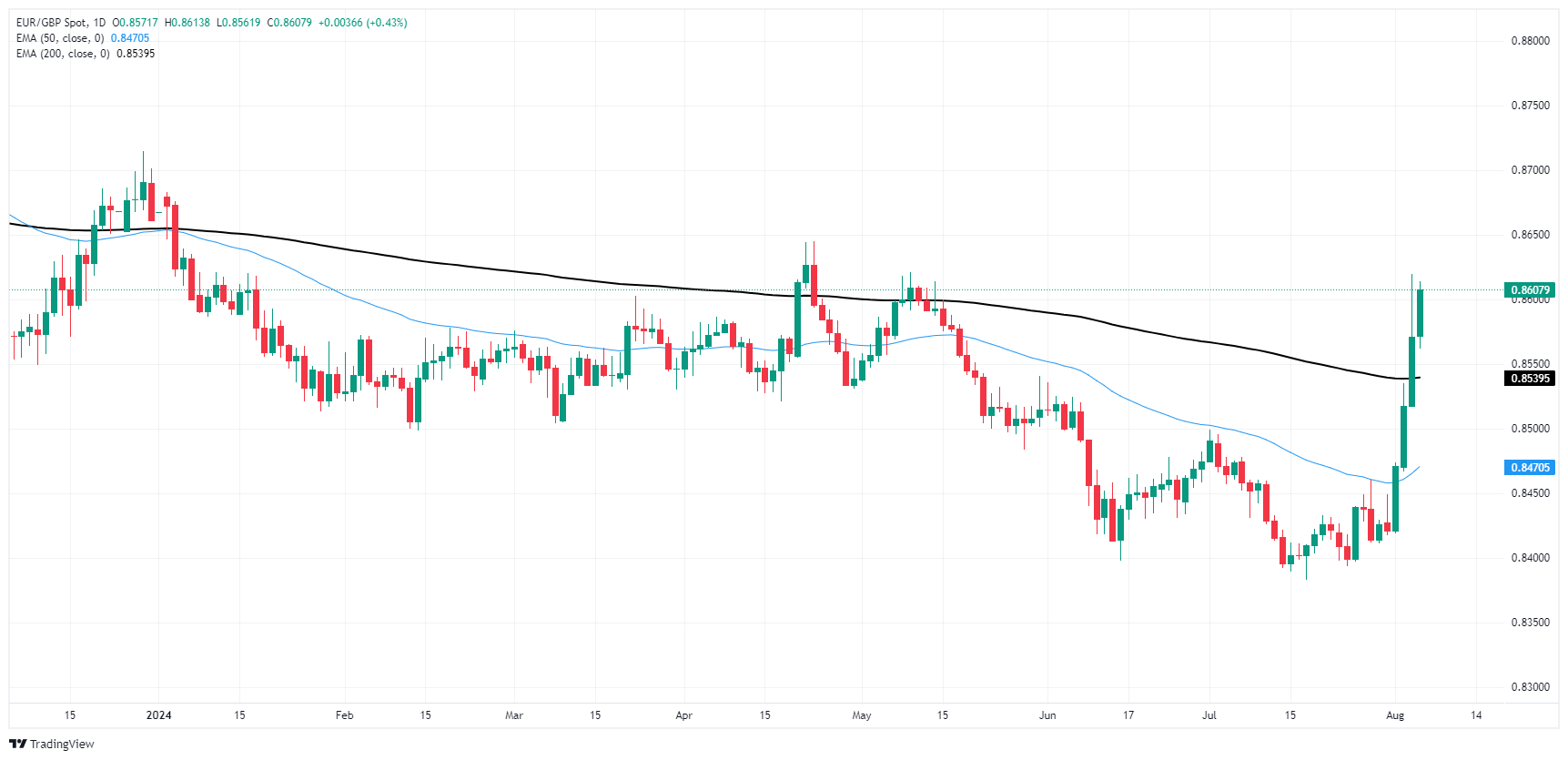- Analytics
- News and Tools
- Market News
- EUR/GBP rises to 13-week peaks on rebalancing Pound Sterling flows
EUR/GBP rises to 13-week peaks on rebalancing Pound Sterling flows
- EUR/GBP continues to challenge 0.8600 as markets pull back from GBP.
- BoE rate cuts and social unrest weigh on Pound Sterling sentiment.
- Race to the bottom as both currencies underperform following bad EU Retail Sales.
EUR/GBP is in a race to the bottom, with the Pound Sterling winning handily as the pair gets bolstered back into 13-week highs despite a misprint in European Retail Sales figures. Market positioning in the Pound Sterling is still heavily-weighted towards buyers, and market flows are rebalancing out of the GBP with the Bank of England (BoE) racing into a cutting cycle.
The Pound Sterling is seeing a steady decline after the BoE trimmed interest rates to 5.0% from 5.25% recently, sparking outflows from broad-market positioning that was previously heavily-weighted in favor of the GBP. With social unrest throughout the UK over the weekend and into the new week, investors are leery about the economic outlook for the kingdom, investors are paring back bullish bets on the Pound Sterling and waiting for signs of stabilization and a better read on how many more time the BoE will cut in 2024.
On the European side, pan-EU Retail Sales contracted -0.3% YoY in June, entirely missing the forecast 0.1% and falling from the previous period’s revised 0.5%. Despite bad data knocking the Euro broadly lower, EUR/GBP is still rallying into multi-month highs as the Pound Sterling drops faster than markets can short the Euro.
EUR/GBP technical outlook
EUR/GBP has climbed back over 0.8600 for the second time in two days, and daily candlesticks are poised for an extended break of the 200-day Exponential Moving Average (EMA) at 0.8545. The pair is on pace to chalk in a fourth straight daily gain, and bidders will be looking to recapture the 0.8650, a price point the pair hasn’t seen since a tumble in January.
EUR/GBP daily chart
Pound Sterling FAQs
The Pound Sterling (GBP) is the oldest currency in the world (886 AD) and the official currency of the United Kingdom. It is the fourth most traded unit for foreign exchange (FX) in the world, accounting for 12% of all transactions, averaging $630 billion a day, according to 2022 data. Its key trading pairs are GBP/USD, aka ‘Cable’, which accounts for 11% of FX, GBP/JPY, or the ‘Dragon’ as it is known by traders (3%), and EUR/GBP (2%). The Pound Sterling is issued by the Bank of England (BoE).
The single most important factor influencing the value of the Pound Sterling is monetary policy decided by the Bank of England. The BoE bases its decisions on whether it has achieved its primary goal of “price stability” – a steady inflation rate of around 2%. Its primary tool for achieving this is the adjustment of interest rates. When inflation is too high, the BoE will try to rein it in by raising interest rates, making it more expensive for people and businesses to access credit. This is generally positive for GBP, as higher interest rates make the UK a more attractive place for global investors to park their money. When inflation falls too low it is a sign economic growth is slowing. In this scenario, the BoE will consider lowering interest rates to cheapen credit so businesses will borrow more to invest in growth-generating projects.
Data releases gauge the health of the economy and can impact the value of the Pound Sterling. Indicators such as GDP, Manufacturing and Services PMIs, and employment can all influence the direction of the GBP. A strong economy is good for Sterling. Not only does it attract more foreign investment but it may encourage the BoE to put up interest rates, which will directly strengthen GBP. Otherwise, if economic data is weak, the Pound Sterling is likely to fall.
Another significant data release for the Pound Sterling is the Trade Balance. This indicator measures the difference between what a country earns from its exports and what it spends on imports over a given period. If a country produces highly sought-after exports, its currency will benefit purely from the extra demand created from foreign buyers seeking to purchase these goods. Therefore, a positive net Trade Balance strengthens a currency and vice versa for a negative balance.
© 2000-2026. All rights reserved.
This site is managed by Teletrade D.J. LLC 2351 LLC 2022 (Euro House, Richmond Hill Road, Kingstown, VC0100, St. Vincent and the Grenadines).
The information on this website is for informational purposes only and does not constitute any investment advice.
The company does not serve or provide services to customers who are residents of the US, Canada, Iran, The Democratic People's Republic of Korea, Yemen and FATF blacklisted countries.
Making transactions on financial markets with marginal financial instruments opens up wide possibilities and allows investors who are willing to take risks to earn high profits, carrying a potentially high risk of losses at the same time. Therefore you should responsibly approach the issue of choosing the appropriate investment strategy, taking the available resources into account, before starting trading.
Use of the information: full or partial use of materials from this website must always be referenced to TeleTrade as the source of information. Use of the materials on the Internet must be accompanied by a hyperlink to teletrade.org. Automatic import of materials and information from this website is prohibited.
Please contact our PR department if you have any questions or need assistance at pr@teletrade.global.















